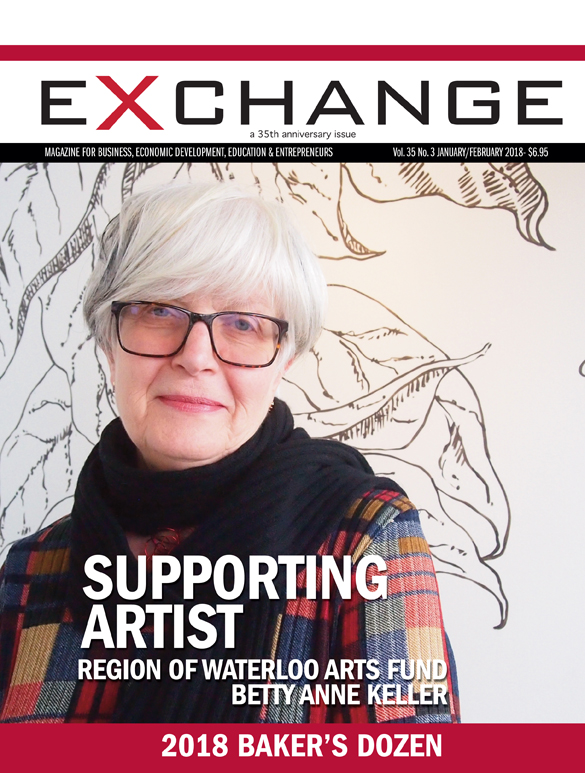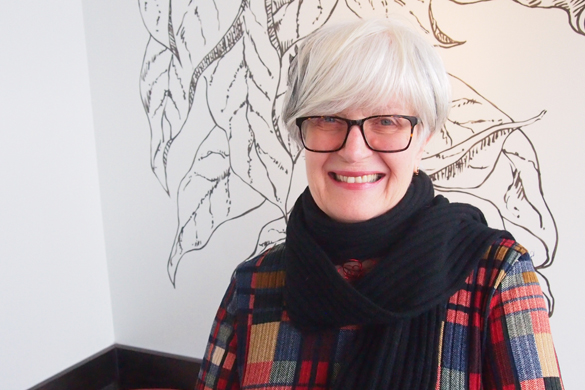 |
|||||
|
|||||
| Betty Anne Keller heads the Waterloo Region Arts Fund | |||||
| By Paul Knowles | |||||
| When Betty Anne Keller agreed to become vice chair of the Region of Waterloo Arts Fund, she knew what she was getting into. The Arts Fund – an arms-length, not-for-profit corporation established in 2002 by the Region of Waterloo to grant funding for visual, performing and literary arts – had taken an image hit over the issue of transparency. In 2013, an editorial in The Record read, in part, “The current system isn’t good enough when it comes to the transparent handling of public money. In its current form, the Waterloo Region Arts Fund looks too much like a private club whose members might, on occasion, enjoy special benefits.” “Too few people were making decisions about a lot of money,” but “I was satisfied that No one accused Fund board members of acting unethically, but there was a widespread sense that the optics had to improve. And that had been the recent atmosphere when Keller came onto the board in January, 2016, recruited to be vice chair with the intention of becoming chair, which she did a year later. Dealing with challenges is right in Keller’s wheelhouse. Today a doting grandmother, she’s the same person who, as a young entrepreneur, brought controversial rock and roll acts like Kiss and Ozzy Osborne to the Aud. For a while, she managed iconic Canadian musician Loreena McKennitt, and for 17 years, she was the arts and culture staffer at the City of Waterloo. Because of her experience in the arts and in public, she admits that she was “skeptical” about the accusations against the board. That doesn’t mean changes were not needed – a new, clearer, conflict of interest policy was developed. But she didn’t buy into the outcry. “I was aware of the issues, but I took it all with several grains of salt,” she told Exchange. “I made a point of finding out more about what had happened.” She concluded that before the changes were initiated, “too few people were making decisions about a lot of money,” but “I was satisfied that changes had been made to improve the integrity of the program.” But she thought more could still be done, and initiated the addition of “artist at large advisors” to the process that decides who receives the Arts Funds’ grants. In adding non-voting artists to the mix, she says, “We feel we’re accessing more information from the community.” But although that budget seems hefty, the truth is that the Arts Fund board receives requests – most of them legitimate candidates – for more than twice that amount of money. When the board is allocating the funds, says Keller, “when reviewing, we look for artistic value, and the ‘Wow’ factor.”
The Arts in Waterloo Region are, frankly, not in good shape. Art is certainly being created by individuals and groups, but “what troubles me is there is no organization to provide leadership to the arts community.” One ongoing issue for the Region’s arts fund is that they are not allowed to fund operating expenses – so it is not rare for a new entity to be created, helped by public funding, only to falter when it proves to be unsustainable and no longer qualifies for funding. Keller believes that this is “a conversation we need to have”. That may be part of a larger conversation Keller believes to be necessary. She says that the Arts in Waterloo Region are, frankly, not in good shape. Art is certainly being created by individuals and groups, but “what troubles me is there is no organization to provide leadership to the arts community.”
At the moment, she believes the Arts Fund is running well, and she’s already looking for her successor – who she’s like to identify this year, so she can retire from her post, in 2019.
And she says, “I’m thinking of making a documentary film about the Region of Waterloo in the 60s, from the perspective of an ‘impresario’” – or in other words, from the perspective of a young, ambitious woman who, some decades later, heads the fund that enables art in Waterloo region. |
|||||
 Not a Subscriber? Receive more business profiles on meaningful people to you. Sent directly to your in box. Our 35th Anniversary Gift To You! Save $14.88 with our first 35th Anniversary subscription digital launch offer. No Cash Value. Cancel anytime. |
|||||
| contact us
Publisher is Exchange Business Communication Inc. |





